Key takeaways:
- Referral rewards build trust and strengthen community relationships, enhancing customer loyalty.
- Local business networking encourages collaboration over competition, leading to mutual growth.
- Personalization and tiered rewards in referral programs can significantly boost participation and loyalty.
- Tracking referral program metrics, including conversion rates and customer feedback, is essential for measuring effectiveness.
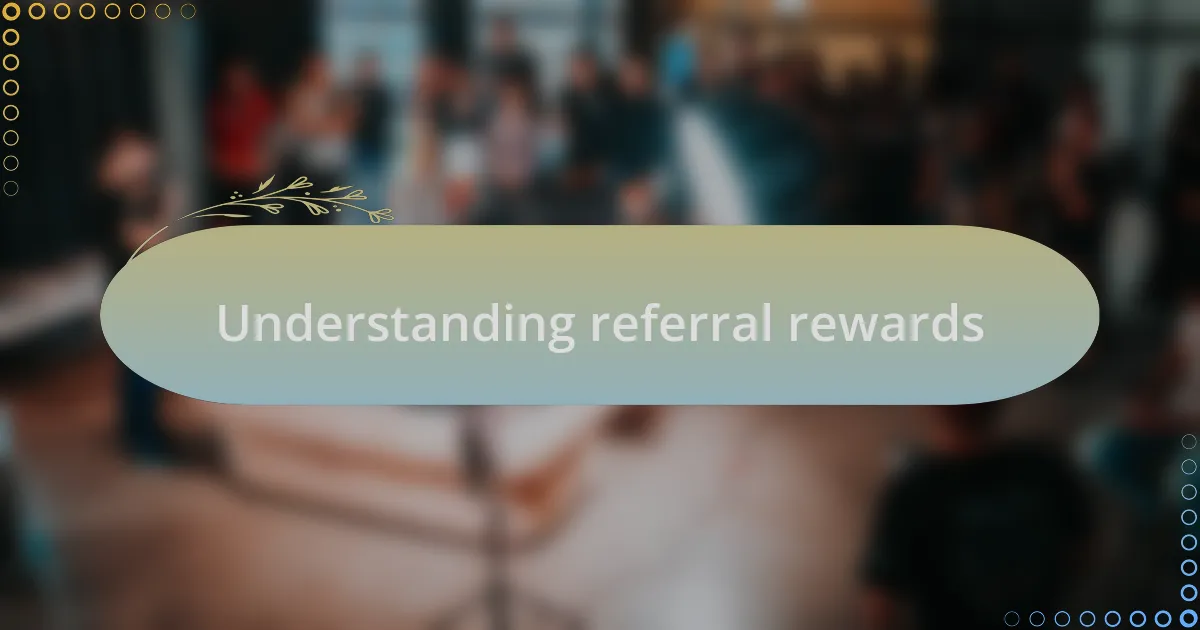
Understanding referral rewards
Referral rewards are more than just incentives; they represent mutual trust and support within a community. I remember the first time I referred a friend to a local business. When I received a thank-you note along with a small discount for my next visit, it felt like more than just a transaction; it was a reaffirmation that this business valued my input and connection.
Think about it: how often do you ask friends for recommendations? It’s only natural that local businesses want to harness this genuine form of marketing through referral rewards. The excitement I felt when my friend shared their positive experience after my recommendation made me realize that these rewards foster lasting relationships and strengthen community bonds.
Moreover, the emotional connection established through referral rewards can lead to repeat customers who not only appreciate the value but also feel personally invested in the business’s success. I often wonder, what if every local business implemented a thoughtful referral program? It could transform how communities support one another, creating a network of loyalty and appreciation that benefits everyone involved.
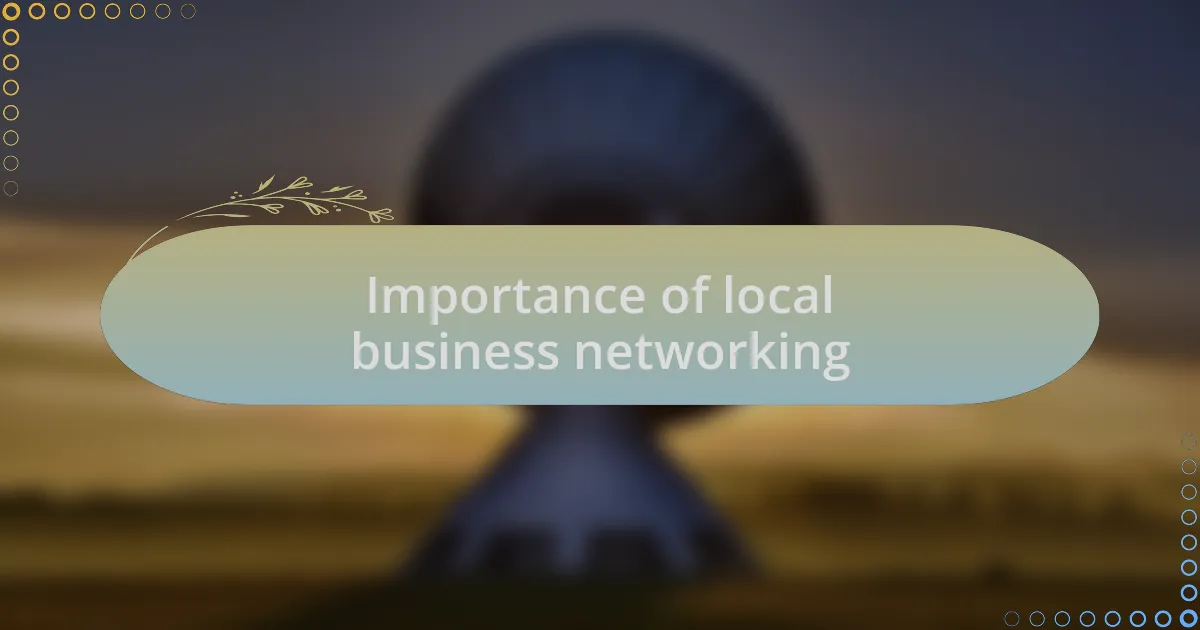
Importance of local business networking
Establishing connections within a local community is invaluable for business growth. I remember attending a neighborhood networking event where I met several small business owners. The synergy in that room was palpable; we exchanged ideas and resources, and I left not just with contacts but friendships that enriched both my personal life and business.
Local business networking is crucial because it fosters collaboration rather than competition. It’s fascinating to see how businesses can thrive when they support one another. I once partnered with a local café to promote a community event, and the turnout exceeded our expectations. It’s moments like these that highlight the power of working together towards common goals.
Ultimately, local networking creates a sense of belonging. Have you ever felt that warm glow when a fellow business owner remembers your name or references a conversation you had? This level of personal touch builds trust and loyalty, making customers more likely to choose local options over larger, impersonal chains. I’ve always felt that these relationships are the backbone of a vibrant local economy.
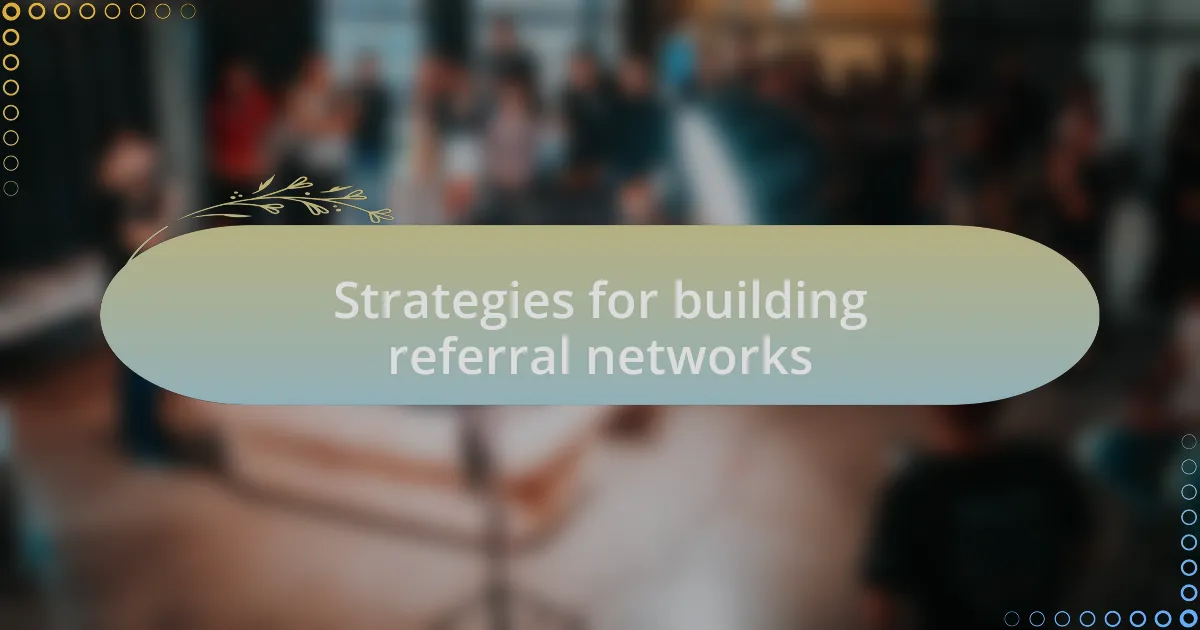
Strategies for building referral networks
Building a robust referral network hinges on genuine relationships. I recall an instance where I reached out to a fellow entrepreneur after a community event; we set up a coffee meeting that blossomed into a mutual support system. By focusing on how we could help one another rather than just pushing our services, we transformed a simple connection into a nurturing partnership.
Another effective strategy is to provide value before asking for referrals. I started offering free workshops on digital marketing to my local business peers, which not only showcased my expertise but also built trust. People responded favorably; they appreciated my willingness to share knowledge, and when I eventually asked for referrals, they were eager to reciprocate. Isn’t it interesting how generosity can pave the way for growth?
Additionally, participating in local events can significantly elevate your presence in the community. I remember attending a charity function where local businesses gathered to support a good cause. Not only did I network with potential referral sources, but I also connected with the community on a deeper level, reinforcing my commitment to local values. How often do we pause to consider the power of shared experiences in building meaningful business relationships? Every connection formed at such events can lead to fruitful referrals later on.
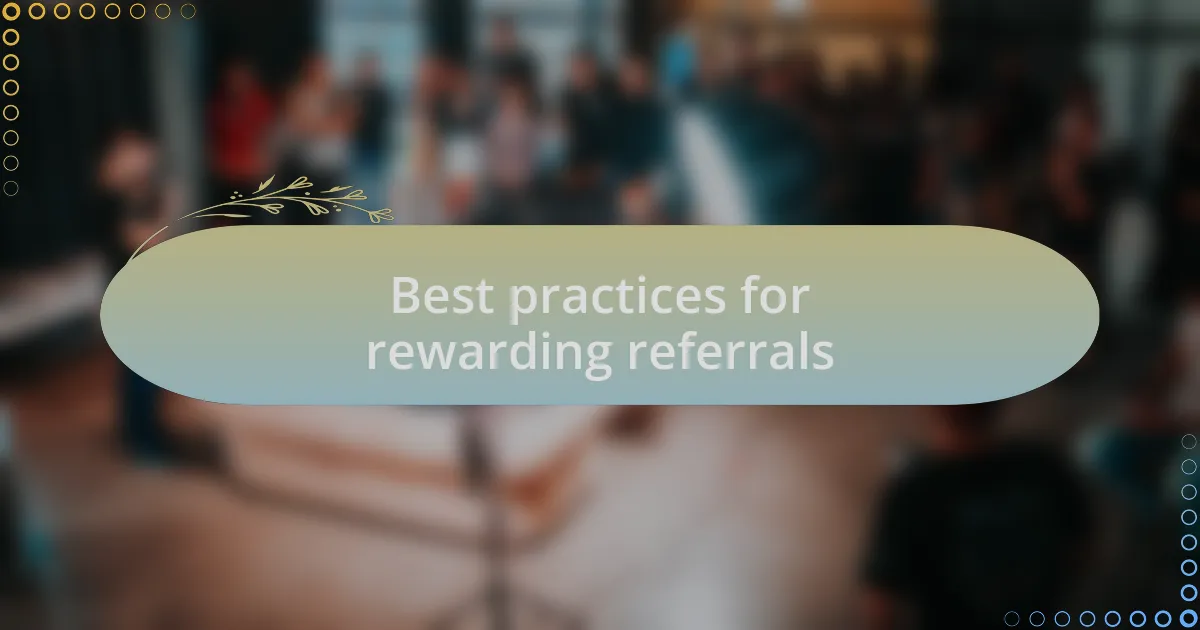
Best practices for rewarding referrals
When it comes to rewarding referrals, I’ve found that personalization makes a significant impact. A few years ago, I started sending handwritten thank-you notes to individuals who referred clients to me. This small gesture conveyed my genuine appreciation and made the referrer feel valued. Have you ever received a personalized note that brightened your day? That’s the kind of warmth we want to foster in our business relationships.
Another best practice I’ve implemented is to offer tiered rewards. For example, I created a system where the more referrals someone provided, the better the rewards became—think gift cards, exclusive workshops, or even a service upgrade. I remember one client who referred multiple businesses and received a complimentary consultation. Their excitement was palpable, and it motivated them to continue referring. Isn’t it fascinating how incentivizing behavior can not only encourage participation but also deepen loyalty?
Lastly, I believe in transparency regarding how reward systems work. I often share with my network the specific criteria for earning rewards. During a recent networking event, I explained the program to attendees while detailing the success stories of those who benefited. This openness builds trust and ensures everyone understands the value of participation. How often do we overlook clarity in our communication? It’s a simple practice that can yield significant dividends in both trust and referrals.
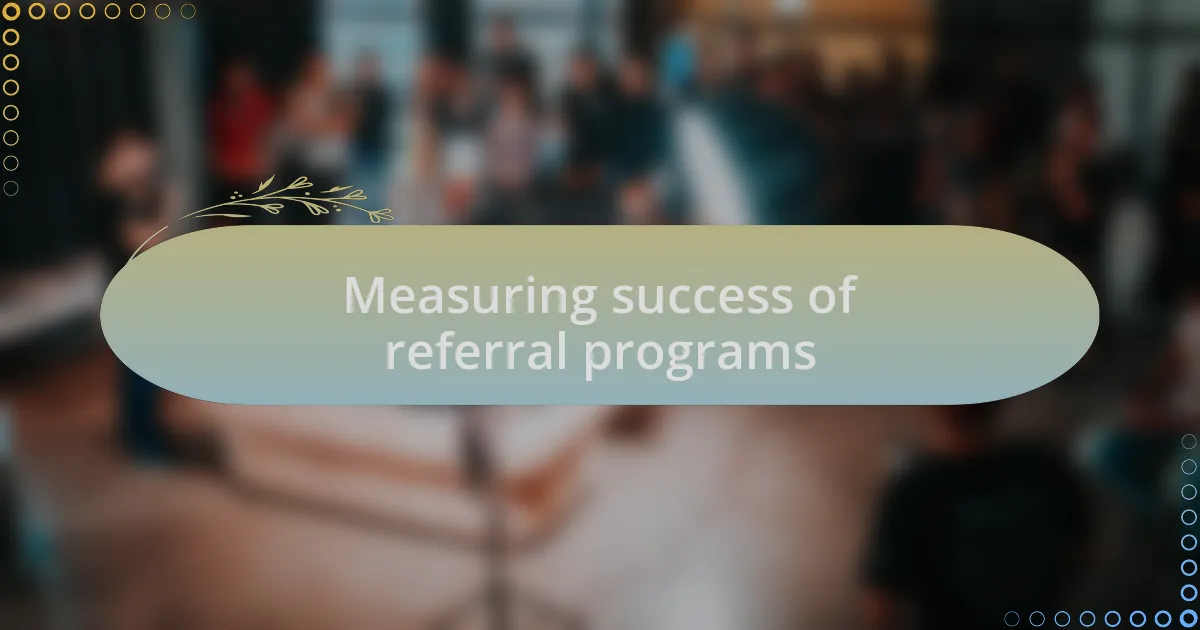
Measuring success of referral programs
To truly understand how effective our referral programs are, I’ve learned the importance of tracking key metrics. For instance, measuring the number of referrals generated over a specific period helps pinpoint trends and identify what motivates my network. Have I ever noticed a spike in referrals after hosting an event? Absolutely, and it’s a clear indicator that personal interactions can significantly enhance engagement.
Another vital aspect of success measurement is analyzing the conversion rate of referrals. I remember the time I noticed that only 20% of referred leads turned into clients. It made me ponder whether I was doing enough to nurture these leads effectively. By refining my follow-up process, I increased that conversion rate to 40%. Isn’t it remarkable how a little adjustment can make a world of difference?
Lastly, customer feedback plays a crucial role in evaluating the effectiveness of referral programs. After implementing a survey for clients referred to me, I gained invaluable insights into their experience and how they found my services. It was eye-opening to see that many new clients felt more confident in choosing my business because they were referred by someone they trusted. Isn’t it empowering to know that our referral strategies resonate beyond mere transactions?
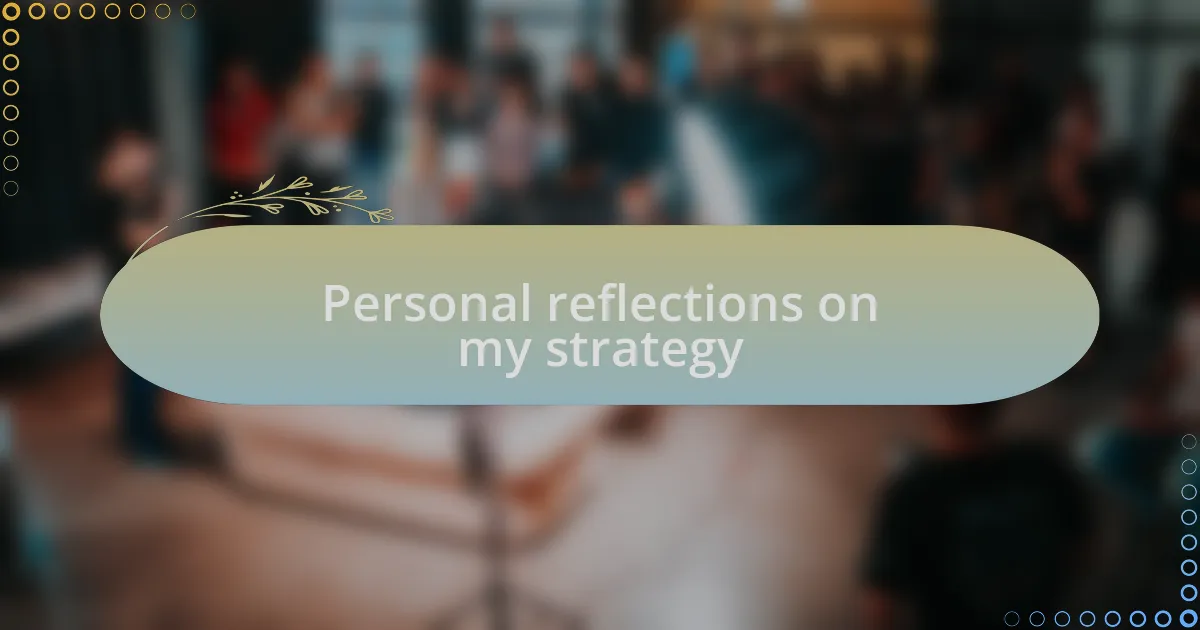
Personal reflections on my strategy
Reflecting on my referral reward strategy, I can’t help but appreciate how personal relationships shape outcomes. I recall a time when I took a chance on reconnecting with a long-lost colleague. When I offered them a referral reward for new clients, it not only reignited our friendship but also led to a series of successful referrals that I hadn’t anticipated. Isn’t it fascinating how nurturing existing relationships can yield unexpected results?
I’ve also discovered the emotional weight behind the word-of-mouth referrals. One day, a referred client expressed to me how the recommendation from their friend made them feel valued and trusted. It struck me that my rewards program wasn’t just about tangible benefits; it was about creating a sense of belonging within my network. Can a simple referral truly foster a deeper connection? My experience tells me it absolutely can.
In assessing my approach, I’ve realized that vulnerability plays a significant role in my strategy. When I openly share my challenges and successes surrounding referrals, it invites others to do the same. I remember sharing my journey at a networking event, and the resulting discussions transformed my perception of collaboration. Is it possible that genuine conversation can lead to richer referrals? Based on my experience, the answer is a resounding yes.